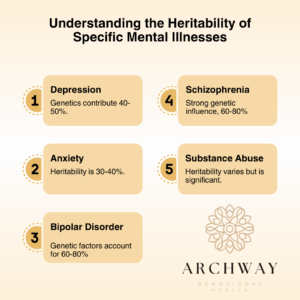Mental illness is a complex issue with multiple contributing factors. While genetic predisposition plays a significant role, it’s important to understand that mental illness is not solely determined by genetics.
The Role of Genetics in Mental Health
Heritability refers to the proportion of variation in a trait that can be attributed to genetic factors. Studies have shown that many mental health conditions have a significant genetic component. This means that if a family member has a mental illness, you may be at a higher risk of developing it yourself.
However, it’s crucial to remember that genetics are not the only factor. Environmental factors, lifestyle choices, and early life experiences can also influence the development of mental illness.
The Complex Nature of Mental Illness
Mental illness is a complex interplay of genetic, environmental, and psychological factors. While genetics may increase your susceptibility, it doesn’t guarantee that you will develop a mental illness.
The Influence of Genetics
Twin and Family Studies:
- Twin studies have been instrumental in understanding the genetic component of mental illness. Monozygotic (identical) twins share 100% of their genes, while dizygotic (fraternal) twins share about 50% of their genes. By comparing the concordance rates of mental illness in these twins, researchers can estimate the heritability of different conditions.
Gene-Environment Interactions:
- While genetics play a role, environmental factors can also influence the development of mental illness. This is known as gene-environment interaction. For example, someone with a genetic predisposition for depression may be more likely to develop the condition if they experience a traumatic event.
The Role of Epigenetics:
- Epigenetics refers to changes in gene expression that are not caused by changes in the DNA sequence. Environmental factors can influence epigenetic changes, which can affect the development of mental illness.
Specific Mental Illnesses and Heritability
While genetics play a role in the development of mental illness, the degree of heritability varies across different conditions. Here are some examples:
- Depression: Studies suggest that heritability for depression is moderate, with genetic factors accounting for about 40-50% of the variation in the condition.
- Anxiety disorders: The heritability of anxiety disorders is also moderate, with genetic factors contributing to approximately 30-40% of the variation.
- Bipolar disorder: Bipolar disorder has a higher heritability than depression and anxiety, with genetic factors accounting for about 60-80% of the variation.
- Schizophrenia: Schizophrenia has a strong genetic component, with heritability estimates ranging from 60-80%.
- Substance abuse disorders: The heritability of substance abuse disorders varies depending on the specific substance, but genetic factors are believed to play a significant role.
Other Factors Contributing to Mental Illness
While genetics play a significant role in the development of mental illness, it’s important to remember that it’s not the sole determining factor. Environmental factors, lifestyle choices, and early life experiences can also contribute to the development of mental health conditions.
Some of the factors that may increase the risk of mental illness include:
- Stressful life events: Traumatic events, such as abuse, neglect, or loss, can increase the risk of mental illness.
- Childhood adversity: Adverse experiences during childhood, such as poverty, neglect, or abuse, can increase the risk of mental health problems later in life.
- Substance abuse: The use of alcohol or drugs can increase the risk of developing mental health conditions.
- Chronic medical conditions: Some chronic medical conditions, such as heart disease or diabetes, can increase the risk of mental illness.
- Lifestyle factors: Factors such as poor diet, lack of exercise, and lack of sleep can contribute to mental health problems.
Conclusion
Mental illness is a complex issue that can significantly impact your overall well-being. It’s important to remember that seeking help is a sign of strength, not weakness. By breaking the stigma and accessing available resources, you can take control of your mental health and lead a fulfilling life.
Archway Behavioral Health is dedicated to providing comprehensive mental health services to individuals in need. Our experienced team of mental health professionals can offer you the support and guidance you need to address your mental health challenges. Contact us today or call us today at (888) 488-4103 to learn more about our services or to schedule an appointment.
FAQs: Can Mental Illness Be Inherited?
What are some common mental illnesses?
Some common mental illnesses include:
- Depression therapy
- Anxiety disorders
- Bipolar disorder
- Schizophrenia
- Substance abuse disorders
Can mental illness be inherited?
While genetics play a significant role in the development of mental illness, it is not solely determined by genes. Environmental factors, lifestyle choices, and early life experiences can also contribute.
How do genetics influence mental illness?
Studies have shown that certain genes may increase an individual’s susceptibility to developing mental illness. However, the exact mechanisms are complex and not fully understood.
What is the role of epigenetics in mental illness?
Epigenetics refers to changes in gene expression that are not caused by changes in the DNA sequence. Environmental factors can influence epigenetic changes, which can affect the development of mental illness.
What are some resources for mental health support?
There are many resources available to support individuals with mental health conditions, including:
- Mental health professionals
- Support groups
- Online resources
- Crisis hotlines
How can I break the stigma surrounding mental illness?
You can help break the stigma by educating yourself about mental health, challenging negative stereotypes, and supporting individuals who are struggling with mental health issues.



